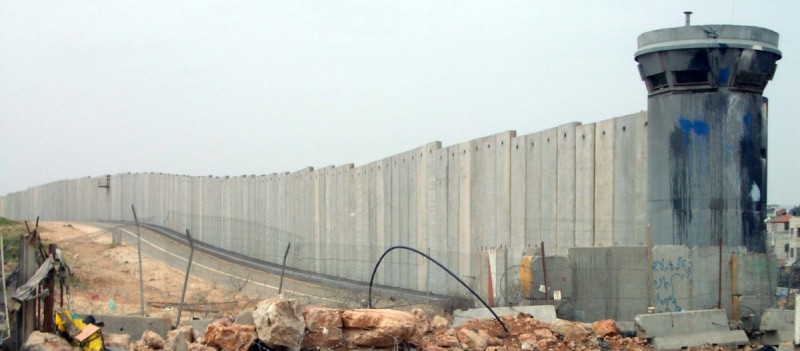The duty to end Israeli apartheid

Qalandiya checkpoint in the West Bank. Photo by Adam Nieman/Flickr.
This week I tried to explain here that the continuing occupation and its transformation from a supposedly temporary situation to a permanent one, with the erasure of the Green Line (for Jews), has created a new situation: It is no longer possible to talk about “apartheid in the territories.” The fate of more than six million Palestinians—Israelis, residents of East Jerusalem, the West Bank and Gaza—is decided by the Jewish government in Jerusalem and the Jewish IDF General Staff in Tel Aviv.
The system they are subject to is without question one of discrimination, oppression, dispossession and separation on the basis of nationality, and therefore is an apartheid system. Democracy for Jews only is of course a joke of democracy. Therefore, if Israel is tyrannical in some of its territory toward some of its subjects—all of Israel is tyrannical. If apartheid exists in some of its territory for some of its residents—it is an apartheid state. No democracy can contain regional tyranny or regional apartheid.
When I was in the village of Ras Kurkar this week, surrounded on all sides by settlements, it was impossible not to think about apartheid. From the balcony of the home I visited, on a clear day you can see the sea. But only Jews are able to go there. The upcoming Knesset election, which will also affect the fate of this village, is for Jews only. One community is immunized, and the one next to it is not, on the basis of nationality—is that not apartheid? Development, construction, water and land—all function based on inherent Jewish supremacy. The justice system is different and the laws are different, the punishment is different for the same actions, for Jews and Arabs. What is this if not apartheid?
This apartheid is shaped by Jewish Israelis. They alone decided upon it, undemocratically, of course. Therefore their state, our state, is an apartheid state, even if Zvi Bar’el does not agree.
This is not mere wordplay. This harsh definition gives rise to practical conclusions that are just as harsh and painful. If this is an apartheid state, then the international community is obligated to treat it as it did its predecessor. Israel, which often complains about being subjected to discriminatory treatment, about a double standard and hypocrisy, not to mention antisemitism, is apparently the most spoiled country in the world. No other state has received so many resources and so much support for decades, while also enjoying incredible tolerance. An apartheid state as the West’s darling, its spoiled child, which is never asked to take real responsibility for its actions and to pay for its crimes.
Its new definition as an apartheid state could force the world to change its attitude. To stop being so forgiving and stop turning a blind eye. It can’t go on believing that the occupation is transitory, that there is a “peace process” that is just “frozen” at the moment, awaiting a Palestinian “partner,” and that a solution is waiting right around the corner.
It will never happen. Israelis will never wake up one morning and recognize that the occupation is not good and not just and must be ended. It just won’t happen. It hasn’t happened for 53 years and there’s no reason it will suddenly happen now. The reason can only be provided by the international community—if it demands that Israel accept responsibility and be subject to punitive measures. This is the international community’s right and duty.
This duty is all the more compelling when we’re no longer talking about temporary violations of international law, fleeting war crimes or a military occupation like any other. When the occupation becomes apartheid and defines the identity of the state, international action is required—yes, just as happened with South Africa. What worked there could work here too. Let’s see what happens when Israelis start to pay for the sins of their state. A true patriot should yearn for that day. Which is why the discussion of Israel as an apartheid state is so important.
Gideon Levy is an Israeli journalist and author.
This article originally appeared in Haaretz.

